Yahoo Answers is shutting down on May 4th, 2021 (Eastern Time) and the Yahoo Answers website is now in read-only mode. There will be no changes to other Yahoo properties or services, or your Yahoo account. You can find more information about the Yahoo Answers shutdown and how to download your data on this help page.
Trending News
Has someone who's totally brain dead ever waked up and been normal?
I have read lots of accounts of people "thought to be brain dead" or declared "almost completely brain dead" waking up and being okay.
I can't find any instances of someone waking up when their brain and brain stem are both completely nonfunctional. Does anyone have any links to a an incident like that?
thanks all. Got the answer I needed a year ago.
8 Answers
- PangolinLv 77 years agoFavorite Answer
I do not know of anyone who has had a proper diagnosis of brain death awakening. There is a difference between coma and death. Here is what is required to declare someone brain dead. It's not a simple thing.
Determination of brain death
The process for brain death certification includes
*Identification of history or physical examination findings that provide a clear etiology of brain dysfunction.
-The determination of brain death requires the identification of the proximate cause and irreversibility of coma. Severe head injury, hypertensive intracerebral hemorrhage, aneurysmal subarachnoid hemorrhage, hypoxic-ischemic brain insults and fulminant hepatic failure are potential causes of irreversible loss of brain function.
-The evaluation of a potentially irreversible coma should include, as may be appropriate to the particular case; clinical or neuro-imaging evidence of an acute CNS catastrophe that is compatible with the clinical diagnosis of brain death;
*Exclusion of any condition that might confound the subsequent examination of cortical or brain stem function. The conditions that may confound clinical diagnosis of brain death are:
-Shock/ hypotension
-Hypothermia -temperature < 32°C
-Drugs known to alter neurologic, neuromuscular function and electroencephalographic testing, like anaesthetic agents, neuroparalytic drugs, methaqualone, barbiturates, benzodiazepines, high dose bretylium, amitryptiline, meprobamate, trichloroethylene, alcohols.
-Brain stem encephalitis.
-Guillain- Barre' syndrome.
-Encephlopathy associated with hepatic failure, uraemia and hyperosmolar coma
-Severe hypophosphatemia.
*Performance of a complete neurological examination. Components of a complete neurological examination are:
-Examination of the patient-absence of spontaneous movement, decerebrate or decorticate posturing, seizures, shivering, response to verbal stimuli, and response to noxious stimuli administered through a cranial nerve path way.
-During the examination spinal reflexes may be present.
-Absent pupillary reflex to direct and consensual light; pupils need not be equal or dilated. The pupillary reflex may be selectively altered by eye trauma, cataracts, high dose dopamine, glutethamide, scopolamine, atropine, bretilium or monoamine oxidase inhibitors.
-Absent corneal, oculocephalic, cough and gag reflexes. The corneal reflex may be altered as a result of facial weakness.
-Absent oculovestibular reflex when tested with 20 to 50 ml. Of ice water irrigated into an external auditory canal clear of cerumen, and after elevating the patients head 30'. Labyrinthine injury or disease, anticholinergics, anticonvulsants, tricyclic antidepressants, and some sedatives may alter response.
-Failure of the heart rate to increase by more than 5 beats per minute after 1- 2 mg. of atropine intravenously. This indicates absent function of the vagus nerve and nuclei.
-Absent respiratory efforts in the presence of hypercarbia.
-Generally, the apnoea test is performed after the second examination of brainstem reflexes.
-The apnoea test need only be performed once when its results are conclusive. Before performing the apnoea test, the physician must determine that the patient meets the following conditions:
-Core temperature ≥ 36.5°C or 97.7°F
-Euvolemia. Option: positive fluid balance in the previous 6 hours
-Normal PCO2. Option: arterial PCO2 ≥ 40 mm Hg
-Normal PO2. Option: pre-oxygenation to arterial PO2 ≥ 200 mm Hg
After determining that the patient meets the above prerequisites, the physician should conduct the apnoea test as follows:
*Connect a pulse oximeter and disconnect the ventilator.
-Deliver 100% O2, 6 l/min, into the trachea. Option: place a cannula at the level of the carina.
-Look closely for any respiratory movements (abdominal or chest excursions that produce adequate tidal volumes).
-Measure arterial PO2, PCO2, and pH after approximately 8 minutes and reconnect the ventilator.
-If respiratory movements are absent and arterial PCO2 is ≥ 60 mm Hg (option: 20 mm Hg increase in PCO2 over a baseline normal PCO2), the apnoea test result is positive (i.e. it supports the diagnosis of brain death).
-If respiratory movements are observed, the apnoea test result is negative (i.e. it does not support the clinical diagnosis of brain death).
-Connect the ventilator, if during testing
the systolic blood pressure becomes < 90 mm Hg (or below age appropriate thresholds in children less than 18 years of age)
or the pulse oximeter indicates significant oxygen desaturation,
or cardiac arrhythmias develop;
-Immediately draw an arterial blood sample and analyze arterial blood gas.
*If PCO2 is ≥ 60 mm Hg or PCO2 increase is ≥ 20 mm Hg over baseline normal PCO2, the apnoea test result is positive (it supports the clinical diagnosis of brain death).
if PCO2 is < 60 mm Hg and PCO2 increase is < 20 mm Hg over baseline normal PCO2, the result is indeterminate and a confirmatory test can be considered.
When appropriate a 10 min. apnoea test can be performed after preoxygenation for 10 minutes with an Fi02 of 1.0 and normalization of patients PaCO2 to 40 mmHG.
*Assessment of brainstem reflexes
-Pupils- no response to bright light Size: midposition (4 mm) to dilated (9 mm) (absent light reflex - cranial nerve II and III)
-Ocular movement- cranial nerve VIII, III and VI
-No oculocephalic reflex (testing only when no fracture or instability of the cervical spine or skull base is apparent)
-No deviation of the eyes to irrigation in each ear with 50 ml of cold water (tympanic membranes intact; allow 1 minute after injection and at least 5 minutes between testing on each side)
-Facial sensation and facial motor response
-No corneal reflex (cranial nerve V and VII)
-No jaw reflex (cranial nerve IX)
-No grimacing to deep pressure on nail bed, supraorbital ridge, or temporo-mandibular joint (afferent V and efferent VII)
-Pharyngeal and tracheal reflexes (cranial nerve IX and X)
-No response after stimulation of the posterior pharynx
-*No cough response to tracheobronchial suctioning
*Clinical observations compatible with the diagnosis of brain death:
The following manifestations are occasionally seen and should not be misinterpreted as evidence for brainstem function:
spontaneous movements of limbs other than pathologic flexion or extension response
respiratory-like movements (shoulder elevation and adduction, back arching, intercostal expansion without significant tidal volumes)
sweating, flushing, tachycardia
normal blood pressure without pharmacologic support or sudden increases in blood pressure
absence of diabetes insipidus
deep tendon reflexes; superficial abdominal reflexes; triple flexion response
Babinski reflex
- Anonymous5 years ago
Sorry Vera, you are absolutely wrong. Not only can they survive, they have survived. Here's just a few: 1) Steven Thorpe, 17 years old. Doctors declared him brain dead and begged the parents to disconnect life support and donate his organs. Guess what? They refused and he survived and fully recovered. 2) Zack Dunlap, 21 years old. Doctors declared him brain dead saying there was absolutely no activity or blood flow to the brain. Being an organ donor, they were just about to harvest his organs when a nurse (who was also a friend) felt he didn't look ready and on an hunch scraped his foot with a pocket knife. Guess what? The foot jerked away and he survived and recovered. 3) Sam Schmid, 21 years old. Doctors declared him brain dead. Guess what? He survived and recovered. FOOD FOR THOUGHT: On Oct 12, 2012, a case was filed in Manhattan with regard to the following: Patrick McMahon, a nurse practitioner and Air Force combat veteran, launched the suit in New York alleging that a major organ donation group is using a quota system for obtaining viable organs. He says it is applying pressure on families and doctors to declare patients dead who are, in fact, still alive and could recover. In 2008, the New England Journal of Medicine printed an article that frankly argued that “brain death” is a sham. The article, co-authored by Dr. Robert D. Truog, a professor of medical ethics and anesthesia (pediatrics) in the Departments of Anesthesia and Social Medicine at Harvard Medical School, said the scientific literature does not support the criteria for ‘brain death’ and ‘cardiac death’ as being real death. “Although it may be ethical to remove vital organs from these patients, we believe that the reason it is ethical cannot convincingly be that the donors are dead,” the article said. So open has the “brain death” secret become in medical circles that some are urging that such criteria simply be dropped. Dr. Neil Lazar, director of the medical-surgical intensive care unit at Toronto General Hospital, Dr. Maxwell J. Smith of the University of Toronto, and David Rodriguez-Arias of Universidad del Pais Vasco in Spain, admitted at a major conference that the pretense should be ended and that organs should be allowed to be removed from “dying” or “severely injured” patients. This more “honest” approach, they said, would avoid the problems created by purely ideological definitions of death that are known to be mere pretexts to expand the organ donor pool.
- Anonymous7 years ago
WoW I just came here to answer because just 5 minutes ago I heard on TV a guy was analyzed dead and waked up at the nectrotomy.I don't know if he was brain dead though.There are effects though that make doctors think someone is dead.
Anyway here is a link I found http://healthland.time.com/2014/01/02/viewpoint-wh...
If it's really a brain death and not some kind of effect I think there is no way of revive.
Oh here is another link just editing this message :P http://news.yahoo.com/brain-dead-doctors-said-yes-...
- JamieLv 77 years ago
Yes a Chinese journalist pronouncerd brain dead after a train crash in England was taken back to China and recovered with orthodox medicine and Chinese accupuncture. It was in the 1990's and I remembere a Chinese doctor expressing her distain at the British doctors.
- 6 years ago
Dont think so my mom had a stroke from a pulmonary embolism when i found her she didnt kno who i was or that paramedics r there to help after 26 years in the medical field she never woke up n i dont wanna kno how shed b if she did





